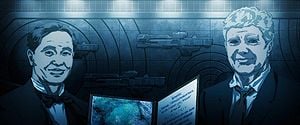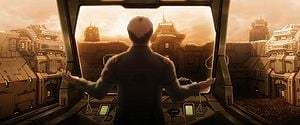History of the United Nations Space Command
From Halopedia, the Halo wiki
| History of the UNSC |
|---|
| Pre-UNSC period |
| - Creation of the United Nations (1945) |
| - Jovian Moons Campaign (2160) |
| - Rain Forest Wars (2162) |
| - Mars Campaign (2163) |
| Interplanetary War (2164–2170) |
| Inner Colony Wars (after 2362) |
| Insurrection (2494–2537, resurgence: 2553–) |
| Human-Covenant War (2525–2552) |
| Post-Covenant War conflicts (2553–) |
- Main article: United Nations Space Command
The United Nations Space Command (UNSC) might be the prime human government in the Halo universe. The UNSC's military arm is called the UNSCDF or the United Nations Space Command Defense Force. This page documents the history of the faction.
History
Pre-UNSC period
The United Nations Space Command's history begins with the official establishment of the United Nations following World War II in 1945, creating for the first time in human history a political and military entity that could administrate worldwide economic, social and military matters such as operations and campaigns aimed at providing humanitarian aid and global military intervention with the objective of preserving peace in unstable regions.
As space exploration progressed in the 21st century, colonization operations required international cooperation and assistance in order to effectively conduct territorial expansion throughout the Solar System. The International Society of Civil Engineers[1] was formed at this time (2021), an organization that contributed immensely to furthering the quality of space engineering. National-conservative philosophies slowly made way for progressive, international globalization to take effect. An imperative change in worldwide government was necessary to accommodate space colonization demands, which the only global administration organization humanity could rely on - the United Nations - took initiative to lead. National governments began to lose their overall authority on a global scale, and it can be assumed that national militaries were absorbed by the international UN military forces.
Solar System colonization
With the radical shift of political power from divided national governments to the global United Nations, human settlement in the Solar System was underway by the mid-21st century. Offering reasonable living conditions and a physical composition similar to that of Earth, Mars was the first planet to be colonized, followed by the Jovian Moons in 2080, and presumably various satellites and asteroids beyond Jupiter afterward.[2][3]
Formation of the UNSC
Political conflicts (2160-2200)
As the UN's campaign of centralization and globalization progressed and increasingly more space settlements were being established, ideological political and economic tensions did not disappear with them. With the transition being made from Earth-based capitalism to post-industrial space capitalism, elements on the extreme fringe of the political left-wing saw a rebirth of doctrinal origin, and revolutionary ideas of change once again took the form of military organizations.
One of these ideological resurgences centered around Russian-born revolutionary Vladimir Koslov, who proceeded to form a Marxist-Leninist guerrilla armed force named after himself; the Koslovics. The new group of communists aimed to dismantle capitalist systems and corporate power on Earth and in newly-occupied space territories, putting a particularly strong emphasis on liberating orbital installations and orchestrating so-called "workers' crusades," or armed campaigns against their foes on the opposite end of the political spectrum.
The Frieden military movement, based in the Jovian Moons and sponsored by corporate powers in the Unified German Republic, reacted once this upsurge of communism became obvious and Koslovic revolutionaries began attacking their infrastructure. Drawing its philosophical origin from twentieth-century Fascism and National Socialism, the Frieden's ardent anti-Koslovic and anti-communism convinced them to adopt revolutionary ideals as well. Among their primary objectives was gaining corporate independence by seceding from UN colonial administration and establishing a self-contained Jovian state. Frieden propaganda claimed that in order to reach a peaceful (as their German name suggests) and independent Jovian nation, the UN, an advocate of internationalism, was to be driven out of the Jovian Moons and destroyed around the Solar System, including on home ground.
United Nations militaries soon found themselves pinned from the extreme left-wing and extreme right-wing alike. These political tensions would soon lead to a final face-down between fascism, communism, and international representatives of democracy throughout various colonies, space environments, and national territories.[4]
Jovian Moons Campaign
Despite Frieden war-mongering propaganda, the Jovian Moons were still held under tight UN control up to 2160. In March of 2160, the Frieden's led its first revolutionary assault against UN authority, attacking UN Colonial Advisors on the moon Io and giving rise to political reactions on Earth. International UN militaries deployed to the Jovian system, engaging the fascist rebellion in three months of battle. It is highly likely the UN forces did not succeed in repelling Frieden attacks, as indicated by future rebel mobilizations.
Additional conflicts
The Jovian Moons Campaign heated tensions within faltering national governments of Earth, paving the way for wars-by-proxy between military corporations, national armies, and political renegades as governments that sponsored colonies in the Solar System responded to Frieden-UN ballistic exchanges and initiated military campaigns of their own, either for their own benefit, or for the benefit or their respective colonies. In a vicious chain reaction, politics on Earth took a downturn to arms mobilization.
Rain Forest Wars
Template:See also Following a relatively blurry outcome in the Jovian Moons, Koslovic, Frieden and UN forces prepared for an engagement in South America in the year 2162, one of the most fertile and economically-promising regions of Earth. Presumably in an attempt to gain some material goods from industries in South America, the two military juntas assaulted each other and the UN troops scrambling to defend home territory, culminating in what is now symbolically known as the Rain Forest Wars.
It can be speculated that the conflict in South America resulted in an enormous amount of human casualties, especially in the lines of infantry on all three sides, due to difficult fighting conditions among the continent's numerous mountain ranges, rainforests, wildlife and volatile weather. Real consequences of the conflict, however, consisted of severe starvation and famine on an international scale - which is reason to believe the UN was no longer acting solely as a military defense force in the face of political extremists, but also as a primary provider of starvation relief - along with a further tensing of military conflicts already raging through the Solar System.[4]
Argyre Planitia Campaign

In the most spectacular offensive since the start of the bloody tripartite war, UN command adopted a military strategy long-forgotten throughout the peace-dominated period prior to the outbreak of the Jovian Moons Campaign in 2160 - the "Blitzkrieg"-style lightning ground assault. After capturing both Frieden and Koslovic forces on Mars, international militaries delivered the first space-deployed contingent of Marines in December of 2163 on a mission to crush communist infantry encampments in the basin of Argyre Planitia, marking a turning-point in space warfare through dedicated utilizations of Marine forces in ground assaults and ship-boarding operations that would follow during the war.
The offensive was an incontestable success for democratic UN militaries. As a result, military theory and strategy implemented the use of Marines in high-priority missions as a baseline for successful operations, especially within the context of larger conflicts.
However, the most important consequence of the anti-totalitarian campaign was of both political and military nature. The United Nations presumably did not control a dedicated space-military prior to the Argyre Planitia Campaign, a lacking element which it would replace with a special emergency military force that would come to represent humanity's overall military might. The United Nations Space Command (or the UN Space Command, as it was initially known) was created.[4]
Final Campaign
As of 2164, psychological results of the campaign on Mars were formidable; civilian trust in the newly-formed UNSC military was boosted by massive televised propaganda, providing the UNSC with large waves of enthusiastic volunteers from all military services around the world. A sense of urgency, courage and hope helped UN forces scramble extraordinary divisions of Marines, infantry and fliers for a final campaign to annihilate remaining communist and fascist outposts and strongholds on Earth as well as throughout the Inner Planets and beyond Jupiter. The final campaign for peace lasted from 2164 to 2170 in a series of brutal crackdowns on Frieden and Koslovic hardliners. The result of this war gathered strong civilian support for some sort of powerful international military that could repel revolts and uprisings wherever they may occur. The UNSC emerged as the leading force to further those goals.[4]
Callisto Treaty
Template:See also Almost paradoxically, the war formally ended where it had begun: in the Jovian Moons. The Callisto Treaty was signed in 2170 by commanders of Koslovic and Frieden forces in the presence of UN colonial authorities, definitively ending the 10-year-long conflict with a victory of UNSC forces and democratic leadership.
Unified Earth Government
Template:See also 2170 saw the creation of the first multinational and multicolonial representation of democracy in outer space. Faced with concerns of overpopulation and starvation on Earth, consequently coupled with a looming destabilization of capitalist economy, the Unified Earth Government was formed in a time of cultural and military reconstruction.[4]
Interstellar Colonization

Massive overpopulation and overmilitarization presented immediate problems for the postwar United Nations Space Command. Utilizing the newly developed Shaw-Fujikawa Slipspace Drive, in 2310 the UNSC deployed a vast line of colony ships to colonize the nearest planets and systems, giving birth to the "Inner Colonies." Vast numbers of citizens and soldiers travel to these new colonies, stabilizing the overpopulation problem on Earth and giving the military new tasks to handle. As the first colonists are stringently selected, the Inner Colonies eventually formed an "elite" society of the best physical and mental human specimens.[4]
By 2490 over eight hundred worlds in the Orion arm of the Milky Way galaxy were colonized. These settlements ranged from fairly well-tamed planetary strongholds to tiny hinterland settlements. Outward expansion continued, and the Inner Colonies become a political and economic stronghold, though they relied heavily on raw materials supplied by the "Outer Colonies."
During this period, the planet Reach (orbiting Epsilon Eridani, right on Earth's metaphorical doorstep) became the UNSC's primary naval yard and training academy. Reach was a major producer of warships and colony vessels, as well as a training ground for covert operatives and Special Forces.
However, this expansion did not come without cost, as ideological and political causes resulted in many of the Outer Colonies engaging in open rebellion. A series of brushfire wars across human space sprang up, with hundreds more threatening to erupt as well. By 2517, UNSC estimates put massive, overwhelming, and uncontrollable rebellion at less than twenty years away. This resulted in the start of the Spartan-II program, to quickly and quietly deal with insurrections without incurring massive civilian casualties.
Inner Colony Wars
The UNSC participated in the Inner Colony Wars in the 2400s'. Almost nothing to little is known about the wars, apart that "instant, unformatted news reports caused massive civil unrest" and "almost tore down Earth's culture." It seems that the war had a major effect upon Earth's cultural development and the UNSC as a whole.[5]
First Special Forces efforts
Before the UNSC expanded its genetic engineering powers to create successful Special Forces programs in the 26th century, the Colonial Military Administration experimented with a prototype Special Forces project in the 24th century that tested the effects of bio-augmentations on Marine Corps and Navy personnel. The experiments proved ineffective and were formally canceled as a result, marking the first attempt to create a specialized force of covert-warfare operators in response to insurgent outbursts within the hierarchical domain of the Unified Earth Government.
Insurrections (2494-)
Military conflicts continued disrupting UNSC authority in the colonies, particularly in the Outer Colonies where serveral uprisings among working-class agriculturalists and other social classes grew unhappy with the UNSC's largely inconsiderate governance. Of major military importance to the UNSC were the rebellions in the Epsilon Indi, Epsilon Eridani and 111 Tauri, and a number of other Outer Colony systems.
ORION Project
Template:See also Due to increasing risk of insurrectionist activity, the Office of Naval Intelligence conceived a project to train Special Forces soldiers in counter-insurgent and counter-revolutionary warfare. The ORION Project sometimes referred to as Spartan I, was an Naval Special Warfare program, overseen by the Colonial Military Administration, created to train special advanced warfare squads to combat the Insurrection. They became experts in counter-insurgency operations, assassinations, raids, and eliminating high value targets (all considered black operations)[6]. ORION Project personnel utilized HEV orbital drops, Hornets, and Pelican dropships to insert into mission areas. However, expectations for the new soldiers were not met, and the project was deactivated in 2506, and all members reassigned to other Special Operations units.[7]
Operation: TREBUCHET
Template:See also Starting 2494 secessionist movements attracted popular support around the Eridanus rebels. Aiming to overthrow UEG authority in the Eridanus Star System, local insurgents undertook a large campaign of military modernization and intelligence-gathering expansion. Relying mainly on coordinated piracy, the Eridanus rebels managed to amass a naval presence of extraordinary strength and size, consisting of modernized Pelican dropships, new-generation corvettes and infiltration prowlers, along with an entire defense fleet of Parabola-class and Laden-class freighters. Their considerable intelligence force often infiltrated UNSC lines of frontier-patrol forces, determining the Earth military to bolster its presence in the Eridanus system.[8]
Eridanus Rebellions
Eridanus II
The year 2513 saw a two-stage battle at Eridanus II; a UNSC response to the rebel overthrow of Eridani government since 2511 that involved a deployment destroyers and carriers to engage the large rebel fleet commanded by Colonel Robert Watts. The battle resulted in severe losses for the rebels, having been routed away from Eridanus II and into the local asteroid belt, but also struck at least four UNSC destroyers in the process.[9]
A second engagement involved the 9th Marine Expeditionary Force on an operation to capture leaders of the movement, and in particular the second-in-command of the Eridanus Rebels in Elysium City on Eridanus II. The brief battle resulted in the leader’s family being killed and the commanding officer of the UNSC detachment, Colonel Ponder being demoted for the failure.
The Eridanus Rebellions saw the only deployment of a full unit of Spartan-Is. The Spartans recovered the sub-orbital station above Eridanus II. In the process they lost only one soldier and were never observed.[10]
Epsilon Eridani rebellions
Unlike rebel activity in the Eridanus Star System, insurrectionists in Epsilon Eridani resorted in 2525 to more covert revolutionary tactics, while taking advantage of local explosive manufacturing facilities in an attempt to render UNSC forces effectively crippled.
Tribute
Fighting continued in Epsilon Eridani. By this point, the war had taken over a million lives, the majority of which being civilians. A Marine Battalion is posted at the colony world of Tribute, commanded by Lieutenant Colonel Aboim and supported by the corvette Template:UNSCship and air support from Hornets. The battalion attempts to put a stop to rebel bomb makers. Two special warfare squads, led by Staff Sergeants Avery Johnson and Nolan Byrne, are involved in disastrous operation in June. Byrne's team is killed during a hostage situation at a Jim Dandy restaurant near Casbah city. Thirty-Eight civilians, three Marines, and two rebels are killed in the bombing. Byrne and Johnson are pulled from the system, and later sent to Harvest.[11]
In the meantime, the Insurrectionists resort to bolder, more deadly tactics, such as the bombing of a luxury civilian liner in orbit over Reach.
Eridanus IV
Insurrectionist movements on Tribute reached the colony Epsilon Eridani IV, sparking an insurgency on the planet which the legendary Admiral Preston Cole was sent to put down.[12]
Epsilon Indi rebellions
Rebellions in the Epsilon Indi System originated from a different strand of ideological dissent than their counterparts in other systems. Located on the absolute fringe of human colonial space and benefitting from extensive infrastructural advantages like largely agricultural industries and resulting social classes, insurgency in Epsilon Indi relied heavily on massive civilian and popular support, drawing sympathizers from its colonies’ working-classes and forming stable anti-UNSC organizations.
Harvest
By 2502, a so-called People’s Occupation Government (or Secessionist Union), rose to challenge Colonial Militia and UNSC Marine forces on Harvest, gravitating around an experienced erstwhile police officer and SWAT operator Jerald Mulkey Ander. His activity leading up to 2502 determined NavSpecWar’s ORION Project to effectively end his rule, deploying a successful mission involving Corporal Avery J. Johnson to assassinate him and his supreme officers as they proceeded with a routine convoy patrol.[13]
Secessionist Union forces were not the sole insurgent powers on Harvest, however. A certain Harvest Rebel Group with branches reaching as far out as the colony Arcadia [14] maintained a well-organized military presence that relied on stolen UNSC weaponry and terrorized government forces wherever they crossed their paths.[15]
111 Tauri Rebellions
Victoria
A more technologically and logistically-sophisticated rebel cell conducted insurrectionist operations on planet Victoria in the 111 Tauri System. In 2537, a certain "united" rebel front used its formidable intelligence manpower to establish a deal with the UNSC whereby experienced Navy medical staff were to treat rebel soldiers affected by Boren's Syndrome in exchange for a stockpile of nuclear weapons captured from UNSC vessels. The trade was "accepted" by the UNSC NavSpecWar, sending Spartan-II Blue Team to recover the nuclear warheads from a rebel camp.[16]
Mamore Rebellion
Template:See also SPARTAN-III Alpha Company responded to an insurrection on the colony of Mamore, marking the first and possibly only operation where generation-III Spartans engaged human opponents.[17]
See also
- History of the UNSC on the Halo Story Page
- Interplanetary War
- Inner Colony Wars
- Human-Covenant War
Sources
- ^ Halo 3 level, Orbital
- ^ Halo: Contact Harvest
- ^ Halo Encyclopedia, page 32
- ^ a b c d e f Xbox.com Halo Storyline
- ^ Second Sunrise Over New Mombasa
- ^ Halo: Contact Harvest Prologue
- ^ Halo Wars Timeline
- ^ ’’Halo: The Fall of Reach,’’ pages 75-76
- ^ Halo: The Fall of Reach, pages 75-77
- ^ Halo Encyclopedia, page 81
- ^ Halo: Contact Harvest, pages 9-20
- ^ ’’Halo Wars: Official Strategy Guide’' page 22
- ^ Halo Graphic Novel, page 122
- ^ Halo Wars, level Pirth Outskirts
- ^ Halo Wars, level Chasm
- ^ Halo: Ghosts of Onyx, chapter one
- ^ Halo: Ghosts of Onyx, page 81


